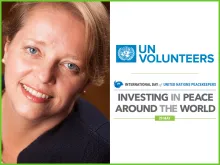On a global scale, peace remains largely an elusive goal often negatively portrayed as merely the absence of violence. The work carried out by UN Volunteers, however, clearly demonstrates that there is much, much more to peace. The unique nature of their engagement in peacebuilding is characterized by solidarity, a will to initiate positive change from within, and a clear commitment to working with the peoples of a region.
Not a day goes by without our world being confronted with the suffering of millions of people because of the ravage of armed conflict and war. The peaceful resolution of conflict and the maintenance of international peace and security are amongst the principle reasons why the United Nations was established. Peacebuilding is at the heart of the UN’s work and continues to be a pressing priority for all UN Member States (A/69/968–S/2015/490).
The pursuit of peace and progress cannot end in a few years in either victory or defeat. The pursuit of peace and progress, with its trials and its errors, its successes and its setbacks, can never be relaxed and never abandoned. – Dag Hammarskjöld (1905–1961), second Secretary-General of the United Nations.
We are beginning to understand not only which factors lead to conflict, but also those that lead to peace. Structures, attitudes, and institutions underpinning peace are slowly being brought to the surface, giving us insight into the motives that drive people to work in support of peace, instead of war.
Over the past two decades, the UN has taken several steps toward reforming its UN peacekeeping operations. The most notable document in this respect is the Report of the Panel on United Nations Peace Operations (Brahimi Report, 2000). From the analysis initiated by this Report, and further developed by the Advisory Group of Experts on the Review of the Peacebuilding Architecture (AGE Report, 2015), and the High-level Independent Panel on Peace Operations (HIPPO Report, 2015), it was concluded that there is no one-size-fits-all solution to peacekeeping. Their overarching conclusions state that sustaining peace is necessarily an endogenous process that requires strong and inclusive participation of local communities.
The HIPPO Report—its policies and recommendations on uniting strengths for peace, politics, partnership and people—is now the leading document on UN Peacekeeping Missions. The Report has far-reaching implications for UNV’s contributions to peace, especially on the role of UN Volunteers in “strengthening engagement with national actors and local communities across mission mandates and assisting in national capacity development.“ It recommends that, “the [UN] Secretariat work closely with the United Nations Volunteers [UNV] programme to further integrate United Nations Volunteers into the community liaison efforts of missions, including through their greater use across occupational groups, and to further develop local capacities.” The Report confirms once again the valuable role that UN Volunteers play within peacekeeping.
Contributing to the realization of these objectives, the United Nations Volunteers (UNV) programme mobilized UN Volunteers to twelve UN Peacekeeping Missions and several political missions around the world. Embedded within local communities, UN Volunteers contribute to peace-making, peacebuilding, peacekeeping, preventive diplomacy, conflict prevention and resolution. UN Volunteers exchange experiences with their local and international counterparts, strengthening capacities in the field, greatly enhancing the building of a more stable and more peaceful environment.
Sustaining peace constitutes a shift in how we think about peace and how we address conflict. As a process and a goal, building sustainable peace is not the burden of outsiders, nor is it a challenge that communities must conquer on their own. Building on the HIPPO Report, the UN Office of Rule of Law and Security Institutions (OROLSI) is drafting a paper on community-level engagement and peace. Once released in Summer 2017, the paper potentially presents once again, for UN Volunteers, new directions and opportunities for yet greater roles in sustaining peace.
For nearly half a century, thousands of UN Volunteers have successfully contributed to the development of national infrastructures for peace. Within this context, the contributions made by UN Volunteers—these women and men working at the community-level—are referred to as crucial and indispensable because UN Volunteers help communities reach lasting peace.
Such is the goal of the United Nations around the Globe, and on the International Day of UN Peacekeepers, UN Volunteers stand ready to continue delivering on that promise.
This article was written by Caecilia Van Peski, Chief, UNV Peace Programming Section.

